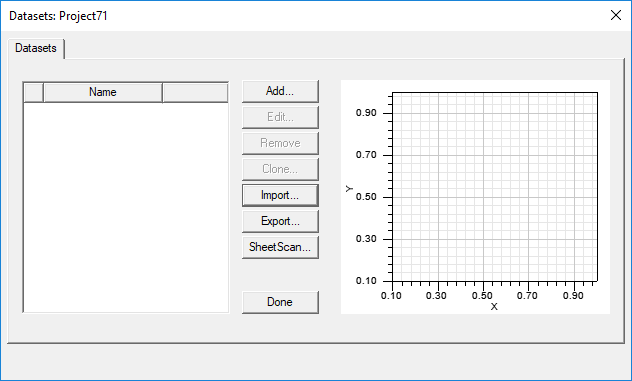Importing Datasets
To import data for a dataset from a file:
- For a project-level dataset, click Project > Datasets.
For a design-level dataset, click Maxwell
3D or Maxwell 2D > Design Datasets or RMxprt > Design
Datasets.
The Datasets window appears.

- Click the Import button.
- In the file browser window that appears,
choose the data file you wish to import from the following file types:Note: The table below lists the file types supported for project-level datasets. For design-level datasets, only .tab files are supported.
.mdx, .mda Twin Builder Characteristic format .xls, .xlsx Microsoft Excel .txt text file .csv Comma-separated value .out Maxwell SPICE (read-only - reads data inside the KW_DATA section) .cfg Comtrade (IEEE Std C37-111-1999) .dat TEK Oscilloscope .tab tab delimited data files - If you select a file type other than .xls, .xlsx, .txt, .dat, .out, or .csv, the data is imported immediately into the Add Dataset window.Note: Importing an .xls or .xlsx file requires Microsoft Excel to be available.
- Selecting an .xls or .xlsx file containing multiple sheets opens a Table Properties window where you can choose the desired sheet from a drop-down menu. Otherwise, selecting an .xls or .xlsx file imports the data immediately into the Add Dataset window.Note: Only the first two columns of data are imported, the left-most column containing the X-coordinate values. The x-coordinate values for successive data points must increase within ten significant digits. Non-numeric entries are assigned a value of zero.
The first row of data is assumed to contain column headings and is ignored. - Selecting a .txt or .csv file opens an Import window in which you can specify the settings for reading the data in the file for import. You can choose the Separator(s) and Decimal Symbol, as well as the line at which to begin the import. The window shows both the original text and the text as it would appear when imported based on the current import settings.
When satisfied with the import settings, click OK to import the data.
Imported datasets take the name of the imported file. If a dataset of the same name already exists, a number will be appended to the end of the new dataset (for example, a duplicate 'dataset' becomes 'dataset1').
- If you select a file type other than .xls, .xlsx, .txt, .dat, .out, or .csv, the data is imported immediately into the Add Dataset window.
- After importing the data, you can modify it manually (see Editing Datasets).
Note: You can also import
a dataset in the Add Dataset and Edit Dataset windows.
